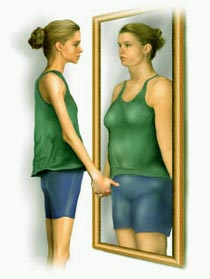Anorexia and bulimia are eating diaorders that can have both psychological and somatic basis that stands for abnormal nutritional behaviour. Anorexia and bulimia are accompanied by a great attention of the person to his weight.
It is established that anorexia and bulimia are mostly women's diseases. They may first appear in the juvenile age and last for long years.
Still as regards pathological behaviour, physiological signs and change of character, anorexia and bulimia are quite different. In case of bulimia there isn't such a considerable loss of weight. If anorexia where loss of weight finally becomes inevitably obvious for people around, the bulimic sufferers can hide their disease for a long time since their weight keeps normal.
Lets' consider how different anorexia and bulimia are.
Pathological behaviour
 Anorexia: restricted food consumptions, diets; rituals connected with eating, such as calculation of calories, shattering of meal, preparation of food for others and eating by oneself; strong fear to put on weight, constant struggle to keep one's weight lower than the norm; fear to be obliged to eat in public (during parties, at restaurants, etc.); hyperactivity (usually exessive sports excercises); hiding one's body under wide hanging clothes.
Anorexia: restricted food consumptions, diets; rituals connected with eating, such as calculation of calories, shattering of meal, preparation of food for others and eating by oneself; strong fear to put on weight, constant struggle to keep one's weight lower than the norm; fear to be obliged to eat in public (during parties, at restaurants, etc.); hyperactivity (usually exessive sports excercises); hiding one's body under wide hanging clothes.
Bulimia: constant concern in food (conversations about weight, calories and diets); overeating , cumpulsive food consumption, inclination to hide food; fear to put on weight; avoiding paties, restaurants, etc.; visitings of a toilet right after meal; use of pharmacological means to grow thin, compulsive vomitting, use of laxatives; strict diets.
Physiological signs
Anorexia: progressive loss of weight (in short periods of time); absence or delays of menses; palenesslor, loss of hair, sensation of cold, blue fingers.
Bulimia: swelling of the parotid gland; haemorrhages of fine blood vessels on the face and under the eyes; chronic irritation of the throat; weariness and pain in muscles; dropout of teeth; wieght fluctuation (5-10 kg upwards and downwards).
Change of character
Anorexia: irritability, anger; depression, diffidence; feeling of guilt during starvation and food consumption.
Bulimia: depression; feeling of guilt and hatred to oneself, absence of self-control; severe self-criticism; seeking for approval of one's deeds and actions; changing opinion concerning body weight.
Thus, anorexia and bulimia are quite different in terms of behaviour, physiological signs and changes of character.
It is established that anorexia and bulimia are mostly women's diseases. They may first appear in the juvenile age and last for long years.
Still as regards pathological behaviour, physiological signs and change of character, anorexia and bulimia are quite different. In case of bulimia there isn't such a considerable loss of weight. If anorexia where loss of weight finally becomes inevitably obvious for people around, the bulimic sufferers can hide their disease for a long time since their weight keeps normal.
Lets' consider how different anorexia and bulimia are.
Pathological behaviour
 Anorexia: restricted food consumptions, diets; rituals connected with eating, such as calculation of calories, shattering of meal, preparation of food for others and eating by oneself; strong fear to put on weight, constant struggle to keep one's weight lower than the norm; fear to be obliged to eat in public (during parties, at restaurants, etc.); hyperactivity (usually exessive sports excercises); hiding one's body under wide hanging clothes.
Anorexia: restricted food consumptions, diets; rituals connected with eating, such as calculation of calories, shattering of meal, preparation of food for others and eating by oneself; strong fear to put on weight, constant struggle to keep one's weight lower than the norm; fear to be obliged to eat in public (during parties, at restaurants, etc.); hyperactivity (usually exessive sports excercises); hiding one's body under wide hanging clothes.Bulimia: constant concern in food (conversations about weight, calories and diets); overeating , cumpulsive food consumption, inclination to hide food; fear to put on weight; avoiding paties, restaurants, etc.; visitings of a toilet right after meal; use of pharmacological means to grow thin, compulsive vomitting, use of laxatives; strict diets.
Physiological signs
Anorexia: progressive loss of weight (in short periods of time); absence or delays of menses; palenesslor, loss of hair, sensation of cold, blue fingers.
Bulimia: swelling of the parotid gland; haemorrhages of fine blood vessels on the face and under the eyes; chronic irritation of the throat; weariness and pain in muscles; dropout of teeth; wieght fluctuation (5-10 kg upwards and downwards).
Change of character
Anorexia: irritability, anger; depression, diffidence; feeling of guilt during starvation and food consumption.
Bulimia: depression; feeling of guilt and hatred to oneself, absence of self-control; severe self-criticism; seeking for approval of one's deeds and actions; changing opinion concerning body weight.
Thus, anorexia and bulimia are quite different in terms of behaviour, physiological signs and changes of character.